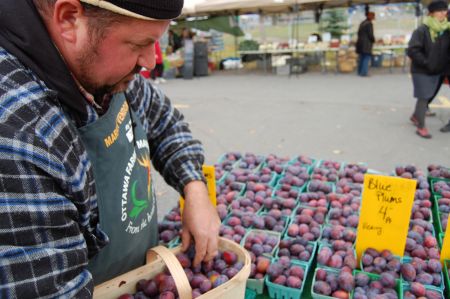OTTAWA—Chris Hall's family has been growing apples in Brockville, Ontario, since 1947. Hall learned as a boy that the orchards usually produce myriad pink and white blossoms in late May. This year, unseasonably warm temperatures brought out the blossoms in April. After the warm spell, temperatures suddenly dropped below freezing, and Hall lost 20 per cent of his apples.
Hall's not the only Ontario farmer reeling from a chaotic spring and summer. Some growers lost their whole crop. “There are two or three farms in our area that didn’t even open their doors this season because they didn’t have any apples,” Hall said. “A hundred years of [farming], and a guy doesn’t even have one bushel of apples. It’s just unheard of.”
David Phillips, a senior climatologist with Environment Canada, said that 2012 has been marked by extraordinary weather, calling the early spring "unprecedented." The devastation of crops following the frosts caused about $100 million in losses to the apple industry in Ontario and around the Great Lakes area, according to Phillips.
"Truly, in my 40 years of weather labour, I've never seen a more dramatic period than that one," Phillips told The Dominion.
After the early bloom and sudden frosts, crops were further damaged by extremely hot and dry weather this summer. This drought stunted the growth of crops that survived the cold snap since there wasn't enough water to "size them up," according to Hall.
Fruit growers weren't the only ones impacted by extreme weather in 2012.
“Unless the farmers managed to irrigate, it was very difficult to grow vegetables this year,” said Brian Hamilton, who represents farmers in Ottawa and neighbouring regions for the Ontario Federation of Agriculture.
According to Hamilton, dry weather also prevented pastures from growing, forcing farmers to feed their livestock with hay they would usually save for winter. Widespread drought in the US has caused prices of hay and other grains to spike.
The drought impacted areas of Ontario including the southern stretch between Lake Huron and Toronto, and along the Niagara Peninsula. But the hot and dry summer was probably worst for farmers in eastern Ontario, from Kingston, north to Renfrew and eastward down the Ottawa Valley, according to Phillips.
In June and July, rainfall in Ottawa was the lowest since record-keeping began in 1889, Phillips told The Dominion. There were 23 days during this period in Ottawa when temperatures topped 30 degrees Celsius, well above the yearly average. "In a normal year in Ottawa, you get maybe twelve of those suckers," said Phillips, who has written several books about Canada's weather and climate.
Some farmers have expressed concern that extreme weather conditions could be a symptom of global climate change.
"I certainly feel that you have to expect the unexpected now," said Kelly Butler, who operates an organic farm near Wakefield, Quebec.
"In my mind, it is climate change. Some people will argue, ‘No, it’s just a one-off.’ But we’ve had record-breaking weather for the last decade, so I would think that change is definitely happening," said Butler, who also manages a weekly farmer's market in Ottawa.
“This drought, or this change in weather patterns, causes severe impacts,” Hamilton said. “Whether or not it will remain, to be long-term, we hope not, because it will definitely hurt us financially if it does.”
It's still too early to attribute this year's extraordinary weather patterns in Ontario directly to rising greenhouse gas emissions, according to geographer and climate scientist Gordon McBean. But these patterns of extreme weather do correspond with current models of global climate change, he said.
"We're seeing more extreme events, different weather than we have seen in the past, and that's due to human-caused greenhouse gases," said McBean, adding that scientists expect instances of extreme weather to recur more frequently as the atmosphere becomes more polluted.
For Phillips, to compare extreme weather events over the past two years alone makes it clear that climate change is occurring rapidly. High rainfall made 2011 "the year of the big wet," he said, while 2012 was "the year of the big dry."
Normally farmers would experience these variations decades apart, Phillips said.
"That kind of back and forth, two extremes in two years, is leaving farmers devastated," he said. "It's almost as if there's a wild card out there, and there's jokers in the weather deck."
David Gordon Koch is a student in the graduate program of journalism at Carleton University. His favorite fruit is the blue plum.



